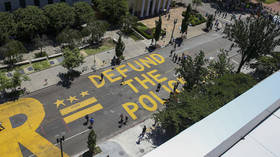As a socialist, here’s why BLM and ‘Defund The Police’ do the left no favors

Black Lives Matters’ signature call to decrease spending on the police is doing those of us on the left a disservice. It’s massively alienating, and is distracting the movement from focusing on even more pressing issues.
Black lives do, and should, matter. Only the most foolish or the most ignorant would agree that people of a certain race are less worthy of life.
But over the past decade the trend in the American “justice” system has been the unfair treatment, in a variety of ways, of black and Latino populations. According to The Washington Post, although half of the people shot and killed by the police are white, black Americans are shot at a disproportionate rate. They account for less than 13% of the US population, but are killed by the police at more than twice the rate of white Americans. Hispanic Americans are also killed by the police at a disproportionate rate.
A country in which state security officers can shoot and kill a 12-year-old, Tamir Rice, for the crime of having a toy gun (like most children in this hyper-armed country), with no legal repercussions, has a lot of changes to make in pursuit of a more just system. However, the rallying call of the Black Lives Matter movement, and far too many activists, has been “defund the police” (or even on occasion “abolish the police”.)
There are many things wrong with this movement that I will go into, but this slogan is emblematic of many of its larger problems.
The average American most likely believes that the idea of “defunding the police” means, in essence, the complete abolition of policing with immediate effect. BLM activists retort that this isn’t so, and that the slogan is more of a call for the redirection of funding away from policing itself, and instead towards treating the root causes of crime. Redirecting this money towards job creation, poverty alleviation, education, and mental health services is a reasonable request. But if your slogan requires a paragraph following it that explains what you actually mean, then it isn’t a very good slogan.
For example, I am in favor of a national healthcare system, but to argue for it, I would never choose a slogan along the lines of “abolish health insurance”. Not only is it highlighting what some people stand to lose – instead of what they might gain – but a slogan without a positive message is bound to make people fearful of the future.
A lot of it may well be a matter of language, but few reasonable people believe that in the US in 2022, we can abolish the police outright anytime soon; there are evils that need to be combated which are aided by the capitalist system. Indeed, it is quite telling that decreasing police spending polls very low among all demographics, which is not surprising given the rising crime rate. One wonders what the poll results would be if the question was framed away from the BLM “defund” slogan, and in favor of messaging that argues for increased funding in other more productive anti-crime areas.
Police violence takes far too many lives in this country, and it is undeniably a problem, but there are other problems facing working-class communities that kill far more people and there have been no mass movements taking to the streets like we have seen with BLM. In the face of the Covid-19 pandemic, workers have lost their jobs, their savings, their homes, and much more. Black workers have fared even worse in this area as statistics show they were more likely to be laid off, and less likely to be rehired.
Ajamu Baraka, activist and writer for the Black Agenda Report as well as co-founder of Black Alliance for Peace wrote in December about BLM, “The streets were filled with righteous indignation demanding ‘justice’ for [George] Floyd and correctly linking the other cases of police violence such as the execution of Breonna Taylor.
“Yet, while the marches demanded that we say the names of Floyd and Taylor and remember Tamir Rice and Sandra Bland – out of sight in run-down nursing homes, overcrowded hospitals, and alone in apartments, our folks were dying in silence. The movement would not claim them; would not say their names or, it seemed – fight for them.
“And even as the lines for food extended for miles, the unemployment check stopped coming and people were driven into the streets by landlords released from moratoriums against evictions. Somehow these crimes of capital did not fit the definition of an assault on our people. It was as if this was neither a “racial justice” issue nor a crime of racialized capitalism.”
And that leads us to the quintessential question about BLM that should be asked of any movement; who exactly is it challenging?
As Baraka points out, BLM has not gone up against the ruling class or even challenged the logic of neoliberalism or austerity, the biggest killers of workers of all colors. Nor does it plan to. At the same time, white saviors who support BLM, but would surely balk at the work that was done by the Black Panther Party in previous decades, use this “defund the police” activism to simply score points in the virtue-signaling game of wokeness.
Any genuine alternative to the current ruling class establishment must be a broad-based grassroots movement rooted in popular sectors. A genuine left does not focus on issues of identity without bringing it back to the common denominator which keeps us all down: class. This is what scares the ruling class – a movement for a new and better future rooted in the issues that bring people together; not wedge issues that further divide the people amongst ourselves.
There is a reason that large and powerful corporations have pledged millions of dollars to BLM. They are betting on BLM and BLM-esque demands and tactics being the hegemonic discourse on the “left”. They want a toothless movement that asks for slight tweaks in capitalism’s more morbid and blatant externalities.
That is, they are fine with a few more black members of the ruling class, but over their dead bodies will the workers have any more power – no matter their color, sexual orientation, or religion.
The statements, views and opinions expressed in this column are solely those of the author and do not necessarily represent those of RT.














